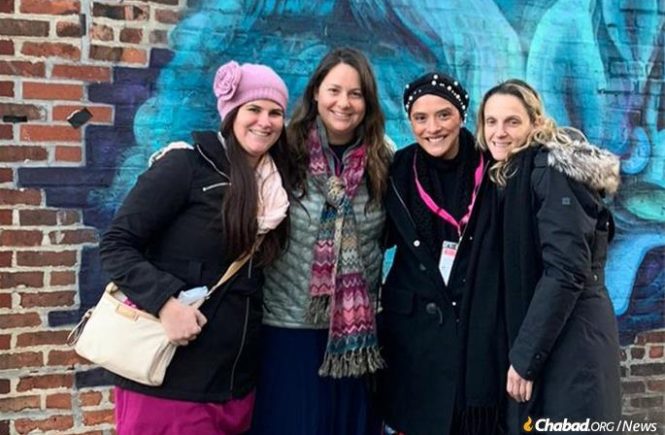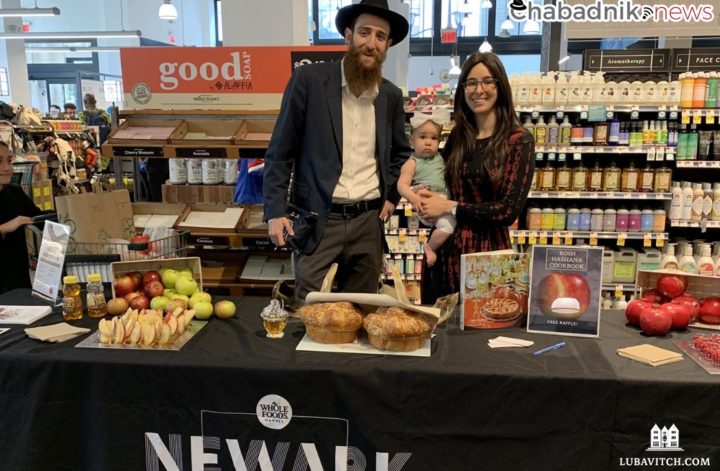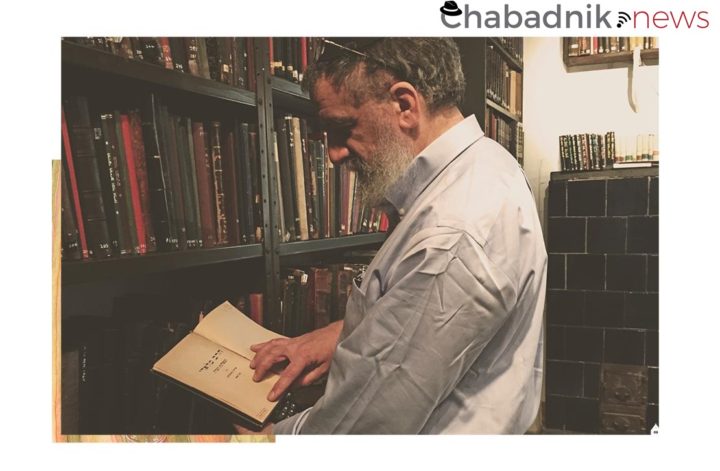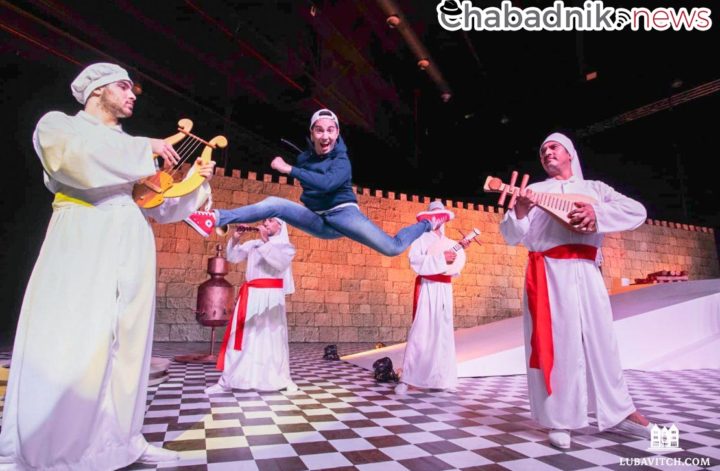As more than 3,000 women from across the globe return home from the International Conference of Chabad-Lubavitch Women Emissaries (Kinus Hashluchos), some of the women who participated in the conference’s guest program reflected on their experiences at the five-day conference.
Martha Schlenger, Santa Fe, N.M.
“Thought-provoking, heartwarming, inspiring” are just some of the adjectives that Martha Schlenger of Santa Fe, N.M., used to describe her first experience at the conference. She says that she feels that the program has inspired her to learn more about her Jewish heritage and about Chabad in general when she returns home. The many people she met and interacted with, all on varying levels of observance, were refreshing. The overarching vibe of the program was one of camaraderie and unity. “Truly welcoming,” she tells Chabad.org. The program was professionally run and the speakers impressive. On Shabbat, the guests participated in a “Stump the Rabbi” session Martha says was particularly enlightening.
“I feel that the experience here at the guest program has turned me into a better representative of the Chabad community in Santa Fe, and that I can now better explain ‘Chabad’ to people who may find it foreign,” she shares.
Martha, a nurse, comes from a nonreligious background. She first met the Chabad shlucha in Santa Fe, Devorah Leah Levertov, at the hospital where she works. Over time, she got to know the Levertov family. “They are truly a terrific bunch,” she says. Martha finds Chabad welcoming and accepting, meeting people where they’re at and wholeheartedly embracing Jews at all levels of observance. “The philosophy that I find most wonderful is that ‘however observant you are is enough,” which gives people the space to grow.
Paula Balansky, Lima, Peru
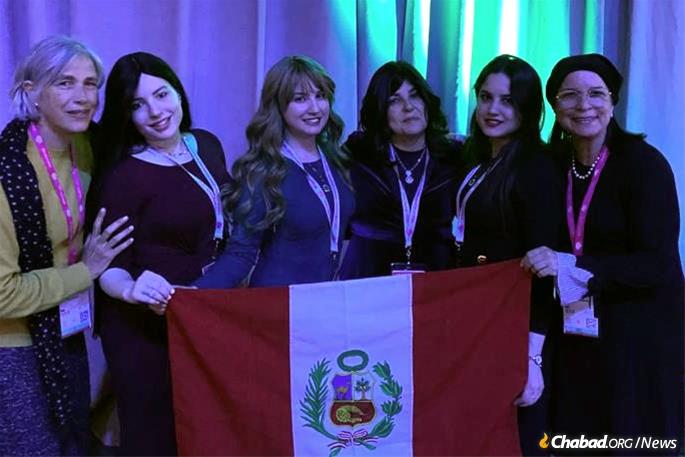
Paula Balansky of Lima, Peru has been attending the Kinus for years. She says the high-quality speakers—Rabbi Manis Friedman, Shimona Tzukernik, to name a few—are “the best.” But what keeps her coming back are friends. The guest program provides her with an opportunity to spend time with old friends, as well as forge new bonds with other participants.
“What I like hearing best is the stories of other women,” she says. “They come from all over, all have different motivations for becoming closer to Chabad.” Hearing these sentiments, she says, is moving and inspiring. Paula’s story began some 20 years ago when the Rabbi Schneur Zalman and Sara Blumenfeld, co-directors of Chabad-Lubavitch of Peru, invited her to attend a Shabbat meal at their home.
“I felt somewhat uncomfortable about the fact that I drove to their home, but I was welcomed with open arms and haven’t looked back since.”
Following that Shabbat, Paula continued to remain in contact with the Blumenfelds and slowly started becoming observant. Twenty years later, she is an active participant of Chabad of Peru and gives classes for women twice a week at the Chabad House in Lima on a variety of Jewish subjects. She works as a corporate image consultant and says she feels that her dedication to modesty has brought immense spiritual blessings to her career. She describes a turning point in her life in which she decided to dress modestly, according to halachah, noting that her goal is to look professional, chic and fashionable.
“As a rule, I’ll never encourage a female model to wear something provocative or exposing. I don’t believe in that,” she says. “I’m not willing to transgress any commandment to get more clients,” she explains, noting how she many times turned down jobs on a Friday afternoon or Saturday so that she wouldn’t have to work on Shabbat. “And people respect it. They work around my schedule so that I don’t have to work on Shabbat. I feel that keeping halachah actually brings blessings in my career.”
Devra Stark, Pardes Hanna, Israel
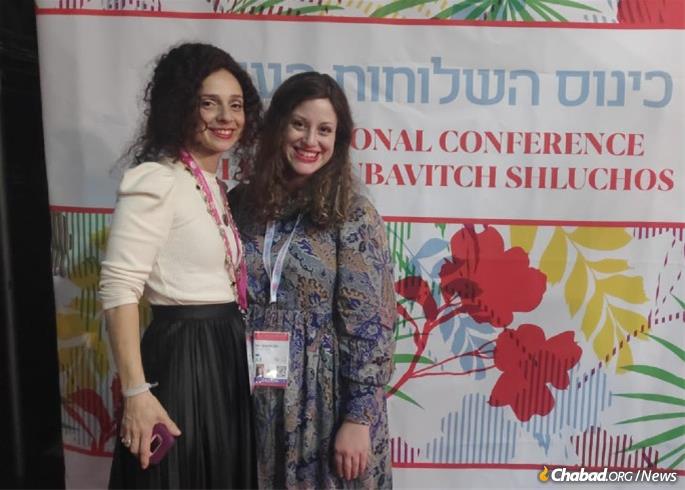
Devra Stark from Pardes Hanna, Israel, came back for her fourth year—this time with her mother, who lives in West Bloomfield, Mich. Devra, a mother of five, notes that it’s a time for her to spiritually recharge.
“It’s easy for mothers to give and give,” she says. That said, she feels it’s important to take a self-care vacation once in a while. “Lots of women go on ‘girls trips’ to beaches or on shopping sprees, but for me, the most rejuvenating experience for me is to visit” the Crown Heights neighborhood in Brooklyn, N.Y., to tap into her religion and heritage.
She says the program gives her a chance to unplug and connect to her spiritual self, as well as to connect to women from different backgrounds. The friends that she’s made have often returned, and she looks forward to spending time with them. She says that each year, she leaves with some inspiration—something she can “take with her.”
Devra says she first attended the guest program with her shlucha, Mushkie Uliel of Abu Tor, Jerusalem, and has been attending the program for four years.
Vanessa Chalem, Boston, Mass.
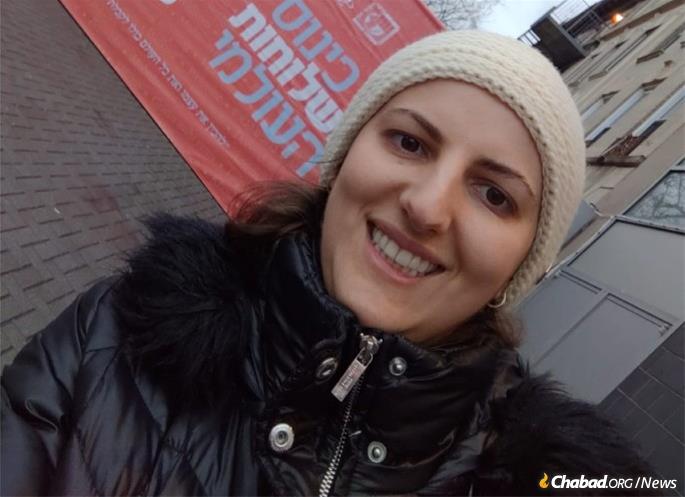
Born in Bogota, Colombia, raised in Aventura, Fla., and now living in Boston, Vanessa Chalem attended the Kinus for the third time, this year. Vanessa, a young professional who works for SalesForce in Cambridge, Mass., described the guest program as an “amazing, amazing experience.”
She relishes a setting in which Chassidic teachings are taught in a very relatable manner. One such example she shared, was the class given by Rabbi Yossi Vigler of the Flatbush neighborhood in Brooklyn. The class was all about the importance of bringing G‑d into one’s day-to-day life, and Chalem says she was moved by how relevant it was to her at that exact moment in time, being that visiting New York is always somewhat of a hectic experience. “It felt like he was speaking to me, explaining how amidst the hustle and bustle of life is when we have the greatest opportunity to bring Hashem in. It hit home that that’s the inner meaning of Dirah Betachtonim, making G‑d comfortable in the most mundane, routine areas of our lives. This is a message I will carry with me throughout the year.”
Vanessa’s journey began with one an inspiring educator, so it’s not surprising that she finds similar intellectual inspiration at the conference. “When I was in ninth grade at Hillel High School of Miami Florida, I had a teacher who really changed my life.”
Chani Negin, then a young Chabad educator who taught Chumash (Bible) and Pirkei Avot (“Ethics of the Fathers”) with a certain passion, would weave Chassidic thought into her classes. Vanessa describes how she had never heard Judaism explained in such a dynamic fashion. While she was intrigued, she was also somewhat “lost” in the heavily text-based class.
“Chani noticed that I was falling behind and made it a point to support me academically. I started doing really well. That was where my journey with Chabad began.”
For the last four years, she has participated in weekly chavruta study at MIT with Mussy Altein, co-director of Chabad Lubavitch of Cambridge, where she learned Sichot, Maamarim and Tanya. Through the learning, Vanessa says she’s gotten to value the teachings of Chassidut. While in college at Brandeis University, she got involved with the Chabad shluchim, Rabbi Peretz and Chanie Chein. After graduating, connected with Rabbi Hirschy and Elkie Zarchi of the Chabad Young Professional community in Cambridge, Mass., as well as with Rabbi Shmuel and Chani Posner, shluchim to Boston University.
Vanessa currently works for Salesforce, a database system on the “cloud,” and in her free time helps shluchim utilize the many features that her company provides, such as noting attendance at events, Shabbat meals, keeping track of donors and automating reminders.
Jessica Mishaan-Abbo, North Miami Beach, Fla.
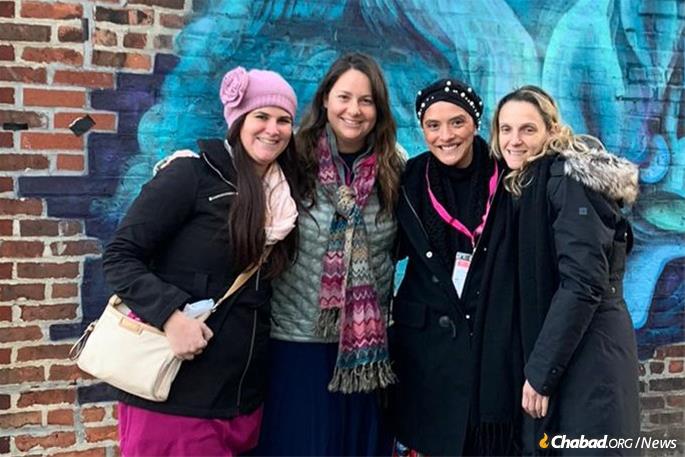
Perhaps the most moving of all stories born from the event is the story of Jessica Mishaan-Abbo from North Miami Beach, Fla., who hails from a large, non-religious family.
Jessica felt somewhat out of place at first at the thought of joining the conference. “I thought, ‘I’m not Chabad. I don’t fully understand what Chabad is all about, but I’ll go for the ride.’ ” Throughout the weekend, Jessica says she was pleasantly surprised to find that the classes and speakers inspirational, giving her food for thought and a fresh perspective on Judaism. Hearing about the Rebbe—Rabbi Menachem M. Schneerson, of righteous memory—and his continued impact on Judaism and on the world at large was especially uplifting. Throughout the weekend, however she did dwell on the following questions: “How is it that I can relate to the Rebbe after his passing? Could the Rebbe connect to me and answer me? Can he help me through the challenges that I may be going through?”
She voiced her concerns to Rivka Kotlarsky, the wife of Rabbi Moshe Kotlarsky, vice chairman of Merkos L’Inyonei Chinuch—the educational arm of the Chabad-Lubavitch movement—who assured her that even now, the Rebbe is able to “find a way” to answer those who reach out to him.
“I believed her, but I didn’t really see it,” relates Jessica.
“When I went to the Ohel on Sunday, I wrote to the Rebbe asking for a lot of general blessings for my family. The only specific thing that I asked for had to do with my speech; I asked that the Rebbe should help me speak in a more refined manner.
“At about 1:30 p.m., I was in the Ohel, reading my letter by the gravesite of the Rebbe. After the visit, I looked at my phone and saw that there was a message on my family’s WhatsApp group from my mother-in-law’s brother that he had sent at 1:26 p.m. It was a message with a photo of a book of Chassidic teachings about the Kabbalistic significance of speech. I found it somewhat odd that he was posting about something ‘religious’ being that this specific relative isn’t what he would describe as a ‘believer.’ I asked this relative which book this was from at about 3:18 p.m., to which he only responded that night with a picture of the Rebbe with a caption that read ‘the Rebbe of Lubavitch.’ I couldn’t believe my eyes. The Rebbe had indeed answered me.”
“Seldom has anything ‘religious’ been posted on the family WhatsApp chat and never before had anyone posted something about the Lubavitcher Rebbe,” says Jessica. This particular relative didn’t even know that she was in Crown Heights for the weekend. He simply had a few questions on Judaism and decided to look at a religious book to try to find answers.
Jessica, her voice noticeably emotional, says, “It became clear to me that for the Rebbe to answer you, you don’t need to be connected in the conventional way. The Rebbe will find a way to answer you.”
“This morning, I had the privilege of touring the Rebbe’s home, where I met Rivka Kotlarsky and told her what had happened. It was an emotional moment for both of us.”

